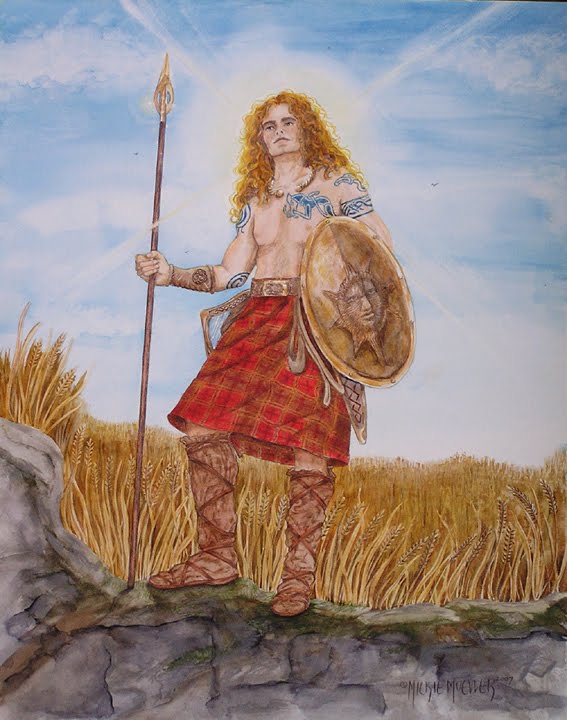As we discussed a couple days ago, Litha is a time to celebrate the abundance and beauty of the Earth as she is warmed by the light of the sum. Accordingly, the gods and goddesses of this Sabbat particularly emphasize the solar aspect, including pregnant goddesses who have been blessed with fertility. Below is a (very!) short list of recognized sun deities revered around the world.
Apollo
Apollo (Ἀπόλλων) is a multi-faceted Greek god of the sun, music, medicine, and healing, among others, and a direct descendant of Zeus by Leto. His popularity grew as worship of him spread through the Roman empire (with no direct Roman equivalent, though later Roman poets often referred to him as Phoebus) and into the British Isles, where he took on many aspects of Celtic deities, such as Apollo Belenus (literally “bright” or “brilliant”) of Gaul, northern Italy, and Noricum.
One of the most important and diverse of the Olympian deities, Apollo was an oracular god — he was seen as the bringer and blesser of truth and prophecy. He actually has two cult sites dedicated to him at Delos and Delphi, and other notable oracular shrines in Clarus and Branchidae, among others.

Likely the most recognizable aspect of Apollonian statutes is his lyre, an instrument that Apollo fell in love with after its creator, Hermes, began to play. Being a god of music, it was no wonder that he became a master of the lyre shortly afterward, playing in several music contests with the likes of Pan, Marsyas, and Cinyras.
Hestia
Another Greek deity! The virginal daughter of Cronus and Rhea, Hestia watched over domesticity and the family, and was honored with the first offering at any sacrifice made in the home. Because of her devotion to her hearthkeeping duties, she always managed to stay out of much of the drama surrounding other Greek deities.

That doesn’t mean she never attracted drama, though. She took her virginity role very seriously, and in one legend, the lustful god Priapus tried to take advantage of her by creeping into her bed, planning on raping Hestia. As he sneaked in, a donkey brayed loud enough to wake the goddess from her sleep, and she let out a scream loud enough to wake the other Olympians.
Hestia was always hospitable, though, taking in strangers without offense and giving sanctuary to female guests so they would not be violated. Those who are called to serve Hestia were obligated to provide shelter and food to anyone truly in need. It is no wonder, then, that her symbol is a lamp with a perpetual flame, always a guide to those in need.
Lugh
Focus on the arts and of music seem to be common themes during Litha, as Lugh, a god of the Celtic people, is yet another who was a god of skill and distribution of talent. While not a god specifically of war, he was also known as a skilled warrior who wielded a magic spear so powerful and bloodthirsty, it often tried to fight without its owner. In parts of Ireland, when a thunderstorm rolls in from the horizon, the locals say that he and Balor are sparring… giving Lugh yet another role, that of god of storms.
If it seems like he is a jack of all trades that is master of none, you’d be sorely wrong. In fact, legend has it that Lugh arrives at Tara, the hall of the high kings of Ireland, to be admitted. The guard tells him that only one person of each particular skill will be admitted: Blacksmith, wheelwright, bard, and so forth. Lugh enumerates all the great things he can do, to which the guard replies each time, “Sorry, we’ve already got someone here who can do that.” Finally, Lugh asks, “Ah, but do you have anyone here who can do them all?”
Needless to say, he was allowed entrance into Tara.

In modern times, Pagans and Wiccans honor Lugh as the champion of artistry and skill, and artisans, musicians, bards, and crafters all invoke Lugh when they need creative assistance.
Lugh is also celebrated on Lughnasadh, his own holiday and harvest feast on 1 August. As with all other Sabbats, I will have more on him and his festival the week beforehand!
Juno and Vesta
Let’s wrap up with two popular Roman goddesses for the summer Solstice. Juno watched over women and marriage, while Vesta was the protector of the hearth and of virginity. Together, these two goddesses were incredibly sacred to Roman women.
The month of June was named for Juno, despite her festival, Matronalia, being celebrated in March. As a goddess of marriage, her month is for weddings and handfastings, and she is often honored by those who are about to embark on that life stage. During Matronalia, women also received gifts from their husbands and daughters.

Vesta also had her own holiday, Vestalia, celebrated from 7-15 June and a time for the inner sanctum of the Vestal Temple to be opened for women to visit and make offerings to the goddess. A sacred flame burned within the Temple, and the Vestales, Vestal Virgins, would swear thirty-year vows of chastity. One of the best known Vestales was Rhea Silvia, who broke her vows with the god Mars, and conceived twins Romulus and Remus.









 Stephanie Fox
Stephanie Fox



Thanks for sharing.
Very welcome! Thanks for reading!
Thanks for reading!